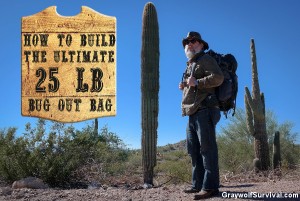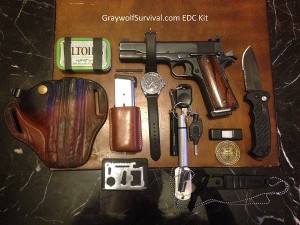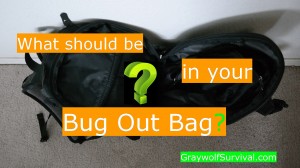Survival psychology is a lot more important than you may think. Surviving a combat or SHTF situation isn’t all about what you have in your bug out bag – or even just what survival skills you have. Your attitude can make the difference between living and dying.
I’ve experienced first-hand the difference attitude can make in the decision-making process in a high-stress survival situation during several combat deployments. People with poor attitudes make poor decisions. They don’t open their mind up to all the possibilities. Even worse, they develop a defeatist attitude.
The definitive book on survival psychology is titled Survival Psychology by John Leach. It is about (obviously from the title) the psychology of human survival and how people change after surviving life-threatening events. It also goes through the psychological consequences of starving, dehydration, freezing and overheating, crowding, being alone, being tired, and sleep deprivation. The great thing about the book is that it’s written in such a way that it can be used to help people in the field and would be a tremendous asset for a SHTF library. So much so that I added it to my Best books to have after SHTF list.
Nothing is good or bad but thinking makes it so.
~ William Shakespeare
A defeatist attitude can get you killed
When your brain starts falling down an endless spiral cycle of negative self-talk, you start losing self-confidence. Without self-confidence, you stop taking risks. Without risks, you can’t make major improvements in your life.
How does this downward spiral cycle happen?
In cognitive therapy, it’s been shown that depressed people get in a cycle of thought called Automatic Thoughts.
- Mind Reading: You start thinking other people are thinking the worst about you, when they really aren’t.
- Fortune-Telling: You start thinking that you are going to die or if you go over that hill that something bad will happen.
- Catastrophizing: You start thinking about the worst thing that could happen and then become convinced that that’s what’s going to happen.
- Labeling: You start assigning negative associations with yourself and others like, “He’s an idiot” or “That guy’s gonna get us all killed.”
- Discounting Positives: You stop internalizing positive ideas. When someone (or yourself) comes up with good idea, you’ll automatically dismiss it.
- Negative Filtering: Whenever something negative comes up, you automatically internalize that and it starts supporting your negativity.
- Overgeneralizing: Every little bad thing that happens becomes proof of your dire situation. Add that to your Discounting Positives, and you can see how you could spiral into a pool of negativity.
Dichotomous thinking: Things become all or nothing. There is no in-between. Going over the hill will either become your salvation or kill you. Then when you try something and it doesn’t turn out to be the be-all-end-all solution, you see it as a bad thing.
- Shoulds: You start looking at things by expectations instead of what needs to be done. You’ll focus on what the others will think of you if you fail a task instead of how to best accomplish the task, for example.
- Personalizing: You start internalizing your expectations and when things go badly, you blame yourself even if it wasn’t within your control.
- Blaming: You start blaming other people as your scapegoat when things go poorly.
- Unfair Comparisons: You start comparing things you should have done with what someone like Survivorman’s Les Stroud would have done even though you don’t have the experience or background to be able to do that.
- Regret Orientation: You dwell on the bad decisions you’ve already made instead of the decisions you need to be making now.
- What if?: You keep asking yourself about situations that are out of proportion with reality like, “what if I fall down a hill and crush my throat so I can’t call for help and then I lie there starving to death while they try to find me.”
- Emotional Reasoning: You stop making decisions based on logic and make them based on how you feel.
- Inability to Disconfirm: You won’t accept any information that would be positive. Any logical arguments are one-sided in favor of the bad in you and your situation.
- Judgment Focus: You start deciding that you will fail because of other failures you’ve had in your life or because you aren’t as good as someone that you know would succeed.
When you start getting a defeatist attitude, you stop thinking through your risk-mitigation strategies thoroughly. You won’t take the chance to go over the next hill to see if there’s a better hunting ground or place to make a shelter because, “it would be a waste of time.” You just sit where you’re at, which may not be a good enough position to survive. If you’ve been watching The Walking Dead, they show this a lot. When Bob had lost his friends, he just floated through life for a while in a daze and didn’t spend much time making adequate shelters or finding help. Once he got with the next group (the guys we know from the show), his attitude improved and he spent more time doing what he needed to survive.
Survival psychology and brain chemicals
Your brain has a part in it called the hypothalamus. It’s the thing that decides how much hormones are going to go through your system. Two of these hormones are called adrenaline and cortisol. Adrenaline raises your heart rate and blood pressure, gets your liver to send glucose through your blood, and increases the flow of blood to your larger muscle groups. This is great if you’re about to fight. Not so good if you need to do something with small hand movements. That’s why it’s so hard to shoot a gun accurately when someone’s shooting back at you. The good thing about your brain sending these signals to your body is that it gives you an advantage if you’re fighting for your life against an animal or another guy. The bad thing is that this causes a lot of stress on your body. When this happens a lot, you become exhausted more often so you can’t get as much work done. You can also develop PTSD or other psychological problems.
Even short-term, intense adrenaline rushes can cause what’s called an adrenaline crash. The first time I experienced it was during riots in Africa where we saw a guy get literally torn apart by a crowd of people and hundreds of people were running around the streets, yelling and fighting. After going through about 10 hours of that, I was on the sat phone with my higher headquarters and it started raining. My friend got on the line and it started pouring so hard he couldn’t hear me – and I started crying. It was a totally weird experience. I felt like I was going through PMS or something.
Poor survival psychology (attitude or mood) can both directly and indirectly affect your health
A stressful situation can lead to depression. Depression can kill your motivation. If you just lay around while you should be scouting for food, building a shelter, or improving your fighting position, you’re putting yourself in a bad spot. If you don’t have things set up properly, you won’t eat enough, will become dehydrated, and will lower your immune system, so you’re get sick more easily, which can either kill you directly or make it more difficult for you to stay motivated to do what it takes to stay alive.
According to Under the Rising Sun: Memories of a Japanese Prisoner of War, A man with a poor attitude often wouldn’t work out, would lie around, and would eat less, which caused them to have less energy. At some point, they’d lose their appetite altogether and then their will to live. They would refuse to eat, and then they would die.
According to the book, Conduct Under Fire: Four American Doctors and Their Fight for Life as Prisonersof the Japanese, 1941-1945, The POW doctors had seen so many prisoners die from having a bad attitude that they wouldn’t waste their time on those prisoners. The ones that had positive attitudes had a much better chance so they focused their medical help on them. That’s a pretty powerful concept.
Poor attitudes lead to poor decisions
As I mentioned, a poor attitude in a high-stress environment can lead to depression. Depressed people have been shown to be more likely to make poor decisions due to something called the ‘pruning process,’ whereby you don’t consider all possible solutions when figuring out what you need to do next. You’re also more likely to see your situation as more dire than it really is so you won’t make decisions needed based on the reality of the situation.
Poor attitudes can directly affect your group’s survival
Do you like hanging around with people who have a bad attitude? Well in a survival or SHTF scenario, that’s going to be even worse. You need to work together to survive. If you or someone in your group has a bad attitude, the others won’t want to hang out with them, will be less likely to take risks to help them, and won’t want to bring them into the decision-making process as easily. You need everyone’s input and everyone’s effort when surviving in a group. One of the key indicators to combat readiness in the military is the command climate, which is essentially the attitude that the troops have about the command and how it works. If attitudes start breaking down, so does combat effectiveness. You may not find yourself fighting terrorists out there but you could be fighting the elements, and they can be even deadlier.
How can you adopt a positive survival attitude?
Positive self-talk
Changing what you say to yourself can have a HUGE effect on your attitude and self-worth. I know this first-hand by using self-talk to get myself out of a bad spot in my life years ago. There are parts of your brain that just vacuum up everything it hears and doesn’t really care who said them – even if you’re the one saying it.
Imagine living with someone who constantly calls you an idiot and criticizes every decision you make, without ever giving you any praise. This is what happens when you have negative self-talk. Just changing this one thing can also directly reduce your stress, which can help in a survival situation.
Meditate
I know a lot of you have never meditated. Believe me, it can make a huge difference. Even the Army is warming up to the idea. it’s made a huge difference in my life over the years and helped me deal with a lot of stressful things. One of the easiest ways I’ve found is to get a hold of a good how-to audio CD on meditation for beginners
. You can get a book too but an audio CD allows you to just close your eyes and listen. As you go through the book, your body starts to slow down and you’ll get a benefit just from listening. If you want the quick down-and-dirty but still a great book, get 8 Minute Meditation: Quiet Your Mind. Change Your Life.
If you want meditation music or whatever, you can just go to pandora or one of those stations and listen for free.
Be prepared
Getting the proper training you need before being in a situation like this will help your attitude a lot. Also having the right supplies and a good plan right at the outset are really helpful. The more you have done prior to a survival situation, the less stressful it will be – not only because you’re ready, but because you know you’re ready.
Assess both the pros and cons of the situation
Make sure that you make a point to evaluate your situation fully. List the pros and cons of what you’re facing as well as any decisions you make. You need to see things as they are to make good decisions. Good decisions lead to good situations and successes. Having success in improving your situation will improve your mood directly and indirectly.
Celebrate small victories
A lot of your attitude comes from your self-esteem. You can improve your self-esteem by celebrating each small victory that you manage to accomplish.
Set yourself goals that are achievable. Make yourself some kind of to-do list. As you accomplish each thing, cross off those things from the list and give yourself some kind of reward. Have you ever been working on your to-do list and thought of something that you had finished already and found yourself putting it on the list just so you could cross it off? Each success is a rush of dopamine to your brain. This rush can become addictive, in the same manner that playing Angry Birds does. As your brain gets washed in different chemicals, it starts to change how it operates. Sometimes just accomplishing things can bring yourself out of a funk.
Continuously be improving your fighting position
You should always be improving your fighting position, even if it’s not a traditional combat situation. A survival situation is where you are combating death. A SHTF situation is where you are combating death and trying to survive a dystopian life. You need to be constantly improving your situation.
Not only does a better position directly affect your life in ways like more efficient hunting or less calories spent collecting water, your stress level goes down because your mind now doesn’t have to dwell on these things as much. Once you start accomplishing things, you not only feel that sense of accomplishment, your attitude starts to improve. Once your attitude starts to improve, you start getting things done.
Exercise itself can change your mood
According to doctors and WebMD:
Improved self-esteem is a key psychological benefit of regular physical activity. When you exercise, your body releases chemicals called endorphins. These endorphins interact with the receptors in your brain that reduce your perception of pain.
Endorphins also trigger a positive feeling in the body, similar to that of morphine. For example, the feeling that follows a run or workout is often described as “euphoric.” That feeling, known as a “runner’s high,” can be accompanied by a positive and energizing outlook on life.
Not only can exercise help a short-term, stress-induced depression that can be caused by living in a survival or SHTF situation, it is even an effective treatment for clinical depression. If you’re in a survival situation such as being lost in the woods, you need to balance your exercise with the amount of calories you’re bringing in. In a SHTF situation, as long as you’ve prepared properly and have a plan for food etc, you should be able to work in a workout.
Not only will exercise help your mood, it will get you in shape. Soldiers train physically every day because it’s a fact that those who are in better shape have a distinct advantage in a survival situation. If you’re out of shape right now, don’t wait until SHTF to get into shape. DO IT NOW!
Eat better to feel better
One of the key ways that I got myself out of being depressed years ago, I learned from the book Food & Mood: The Complete Guide to Eating Well and Feeling Your Best, Second Edition. You may not have much choice in what you eat if you’re trying to get yourself unlost but what you do happen to find is actually better for you than you’d eat at home. In the short run, starvation or dehydration can affect your thinking. In the long run, the wrong foods will tear down your immune system and make you not function as well.
Overall, if you can eat unprocessed food, you’ll not only become healthier, you’ll actually be in a better mood. Processed food will do the opposite.
In a SHTF situation, one of the best things you can do is set up an aquaponics system in your home or bugout location. Not only will it give you a sustainable source of food, it will be a healthy, sustainable source of food. It’s actually pretty simple to set one up. You can get a inexpensive easy step-by-step instructions that are pretty cheap to make.
Perform an altruistic act
According to Fast Company, a specialist in Applied Positive Psychology who wrote Creating Your Best Life: The Ultimate Life List Guide says,
“Altruistic behavior gives you the ‘helper’s high’ and there are many ways to do something generous or kind in a few short minutes,”
Make a habit of doing something for someone every day. When you find yourself in a survival situation at some point, don’t forget to keep doing that.
Start now
Don’t wait until you’re in a survival situation to start learning how to take care of your body and your mind – start now!
![Your attitude can affect your chances of survival [image source: The Guardian]](http://graywolfsurvival.com/wp-content/uploads/2014/03/Attitude_6.jpg)













Excellent advice on the importance of a positive mental outlook even during ‘normal’ times – the best I’ve ever read. No clinical BS, just real experience – thank you!
thank you for article..im glad i stumbled upon it….i realize that i am just depressed and this is why i am so negative and at the same time trying to be a people pleaser…i enjoyed reading this article…and all the references you made…thank you!
Great information. Keep sending us more.